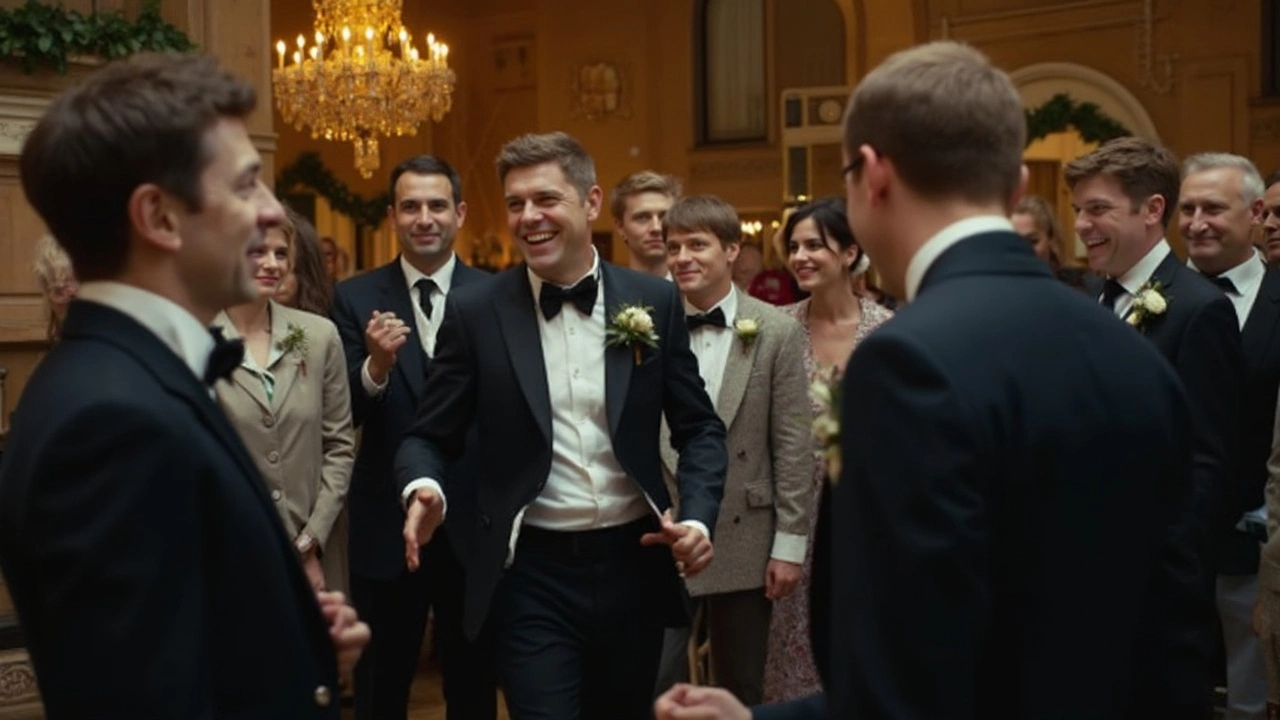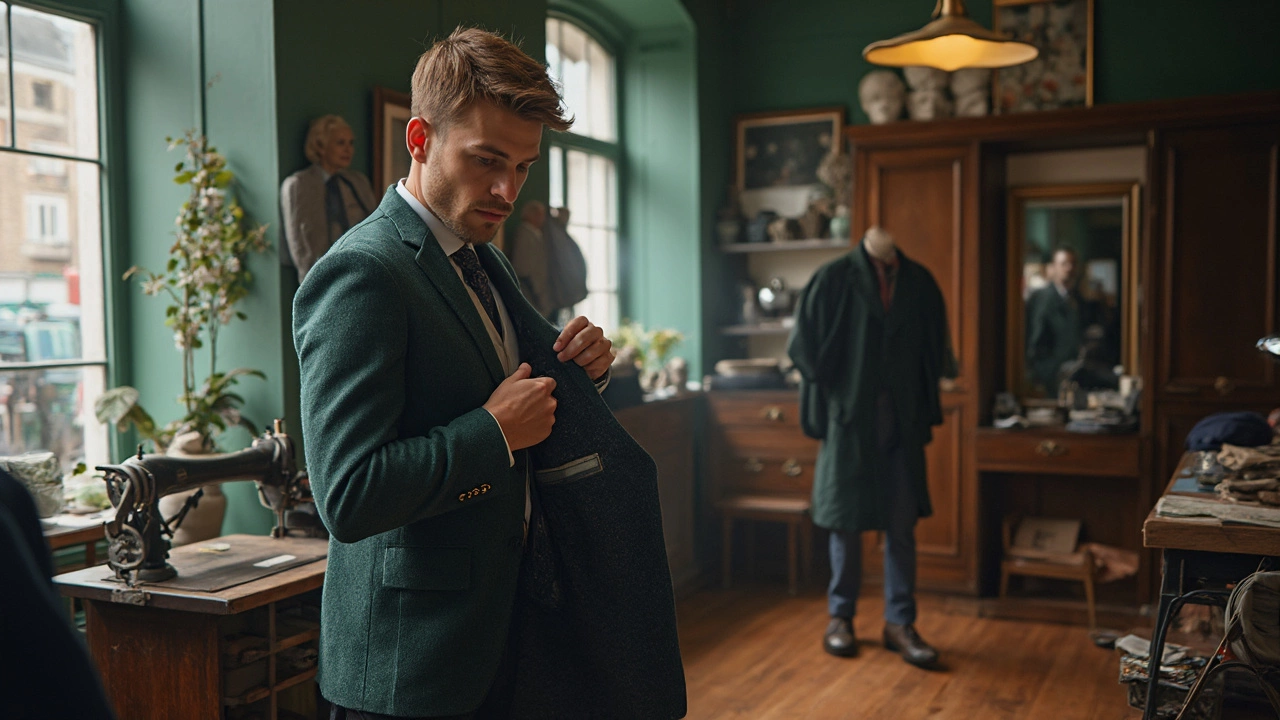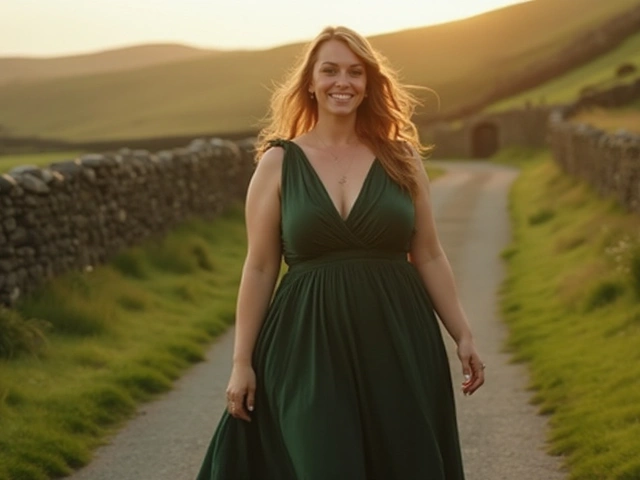Stand on Grafton Street for a few minutes and you’ll spot lads in everything from tracksuits to tuxedos. But when it’s an occasion—a big interview at a Dublin tech firm, a wedding in Kilkenny, or day two at the Galway Races—you’ll see suits everywhere. That gets you thinking: should you splash out on the pricey suit, or stick to the high street?
Suits in Ireland can be tricky. Our weather flips on a dime, so fabric choice does matter—we get more than our fair share of rain, and sudden sunshine during a wedding photo outside the church can catch you off guard if you’ve gone for something too heavy. Then there’s value for money. A suit at a chain store in Limerick might look sharp for a few outings, but will it hold up for that third wedding in Mayo next year?
Irish workplaces are changing too. While the Silicon Docks in Dublin are full of chinos and hoodies, if you turn up at a legal firm or hop into an interview for a government job in Cork, people still expect a suit. Being underdressed is still a sin at an Irish funeral or most formal events. But nobody wants to feel mugged off, paying two grand for a suit that rarely leaves the wardrobe.
- Why Buy an Expensive Suit in Ireland?
- The Real Difference: Fabric, Fit, and Finish
- Irish Tailors, Brands, and Where to Shop
- When to Rent, Buy, or Go Bespoke
Why Buy an Expensive Suit in Ireland?
If you’ve ever seen a lad in a cheap suit at an Irish wedding—jacket too tight, trousers bunching, threads fraying by the buffet—you know why it’s worth thinking twice before saving a few quid. In Ireland, the right suit stands out, and not just in selfies. People notice quality, especially at important events like Confirmations, job interviews, and big nights out in Cork or Galway.
Here’s the real kicker: a well-made suit lasts years if you look after it. You’re not just buying clothes, you’re investing in first impressions that matter, whether you’re meeting a client in Ballsbridge or showing up at your cousin’s wedding in Sligo.
- Fit matters more in Ireland: Most off-the-rack suits from high street chains are cut for "average" builds. Real life? Nobody’s average. Good suits, especially those bought at local tailors like Louis Copeland or Magee 1866, actually fit, so you’re not fiddling with cuffs or tugging at your collar during the speeches.
- Irish weather is unpredictable: Better fabrics make a difference. High-end wool suits breathe when it’s muggy, stay warm when it’s Baltic, and don’t go shiny after a year. Cheap poly blends? You’ll sweat buckets in summer and freeze in the winter wind off the Liffey.
- Events are social currency: Don’t underestimate how often you’ll need a respectable suit—think work do’s, debs, funerals, and Communions. Most Irish families get a lot of mileage out of one solid, well-tailored suit.
The upfront cost can feel rough, but over time a decent suit usually saves money. Here are some rough costs for buying versus renting in Ireland:
| Type | Initial Cost (€) | Wear Count (5 Years) | Average Cost Per Wear (€) |
|---|---|---|---|
| Off-the-Rack High Street | 200 | 10 | 20 |
| Rental (Each Event) | 100 | 5 | 20 |
| Quality Tailored Suit | 800 | 30 | 27 |
The suit from Penneys might seem a bargain for the first job interview. But in Ireland, where suits come out more often than you think, paying more for one that fits well and lasts makes sense for your wallet and your reputation.
The Real Difference: Fabric, Fit, and Finish
Walk into Louis Copeland in Dublin or McKenna Man in Galway, and you’ll notice there’s a real step up from the standard high street suit. The truth is, you’re paying for three things: what the suit is made of, how it fits, and the finishing touches that make it last.
First, fabric. In Ireland, you want a suit that works with our damp, chilly weather—not against it. Most expensive suits use pure wool or wool blends. Wool breathes well, sheds a rain shower, and feels solid without being bulky. You might spot Italian mills like Loro Piana or Irish-made tweeds, especially from brands like Magee 1866 in Donegal. Cheaper suits at places like Penneys usually stick with polyester or polyester blends, which look shiny fast, hold sweat, and don’t last half as long. If you want the suit to survive a few winters and a dozen rounds on the dancefloor, wool is the safe bet.
Next up is fit. You can actually get a high street suit tailored to you, but when you’re buying from somewhere like Brown Thomas or with an independent Irish tailor, you’re getting custom adjustments. Shoulders fit snug, sleeves hit right at the wrist, trousers break clean at the shoe. A good expensive suit almost disappears on your body—you don’t spend the night tugging at your cuffs or yanking up your trousers after a spin at an Irish wedding. That smart fit is what makes you look sharp, not just the price tag.
Finish is all the little things: buttons, lining, stitching. Proper horn or corozo buttons are standard on a pricey Irish suit, not cheap plastic. Good suits have hand-stitched details and strong linings, so you’re not ripping the inside just leaning over at the pub. Even the way the suit’s pressed and packed can matter—the big shops in Belfast or Dublin will usually steam your suit and fit it on you in-store before you leave, meaning you turn heads for the right reasons as soon as you walk out.
- Look for 100% wool or a quality wool blend if you want your suit to last in Irish conditions.
- Bring the shoes you’ll wear to fittings, so trousers get hemmed right for you.
- Check labels for where the cloth is made: Donegal tweed isn't just for tourists—locals wear it for winter weddings and Sundays in the stand at Croke Park.
- If the jacket bunches when you button it or the collar lifts, ask for adjustments—it should slide on easily and move with you.
It’s the small stuff that makes all the difference. When you see an expensive suit side-by-side with a budget one, you’ll spot it straight off, and so will everyone else at the table.

Irish Tailors, Brands, and Where to Shop
If you want a suit that feels made for you, Ireland’s got options—much more than the obvious shop windows on Henry Street. Let’s get straight to names that locals trust. Louis Copeland & Sons is a Dublin icon, with shops in Cork and Galway too. They’ve been kitting out politicians and rugby stars for decades, and they’ll walk you through everything from fabric to fit. They’re not cheap, but you get the whole experience—precise measurements, full fittings, and honest advice. Even if you don’t buy, popping in just to talk about suits is worth it.
For lads who want something a bit more modern (but still classic), Diffney is a solid shout. They’re up and down the east coast, with branches in Dublin and Bray. They often have mid-range price tags, good deals during sales, and a strong mix of Italian and homegrown styles. Suits Distributors in Cork have built a reputation for value, especially for weddings or debs—think bulk offers for groomsmen or even full group fittings.
If you’re thinking about supporting something homegrown, Magee 1866 is a Donegal legend. They’re famous for tweed—great for winter weddings or something a bit different—and all their menswear is made with Irish fabric and heritage in mind. You’ll pay a bit more, but you’re buying a slice of Irish style history.
Sometimes you just need a suit in a hurry. High street is handy, and places like Marks & Spencer or Next usually have classic cuts at prices that don’t sting. But be careful with fit and fabric—off-the-rack suits can look boxy if you don’t get them tailored locally. Some lads pop into The Zip Yard for fiddly adjustments; a little nip and tuck can make even a budget suit look sharp.
When you’re figuring out where to spend your cash on expensive suits, don’t forget about second-hand and vintage stores. Dublin’s Covenant or Siopaella sometimes have gems—ex-rental tuxes or pre-loved Italian jackets for half the price. If you’re lucky, you’ll find a bargain that just needs a quick clean or small repair.
So, in Ireland, it pays to hunt around and try before you buy. Mix the big reputations with local indie tailors—sometimes that tiny shop off Patrick Street can surprise you with personal service. And if you’re not sure? Ask at work or a family wedding. Irish blokes love talking about where they got a good suit—especially if they paid less than their brother-in-law.
When to Rent, Buy, or Go Bespoke
If you’re weighing up dumping a pile of cash on a suit or just grabbing a rental, think about what events you’ll actually need it for and how often you’ll wear it. Renting makes loads of sense in Ireland for one-offs—like your mate’s black-tie wedding at Carton House, or if you’re best man and the couple’s gone rogue with a three-piece and bowtie dress code. You just head to Bond Brothers in Stillorgan or Saville Menswear and pick a look, no stress about dry cleaning or repairs.
Buying is the middle ground, especially if you’re hitting a few weddings a year, interviews, or even Dublin’s more old-school offices. Suits Direct and Louis Copeland are two Irish spots where you get a good blend of style and longevity. If you stick to navy, dark grey, or charcoal, you’ll be sorted for pretty much everything—interviews, funerals, work events, all sorts. Spending a bit more here often means you get sturdier fabrics and actually decent tailoring, which helps when Irish weather tries to ruin your day.
Now, bespoke. This is the full works—think hand-picked fabric, local tailors taking your measurements, and fittings until it’s perfect. It’s usually the realm of big occasions (your own wedding, big deal job promotions, or if you just love the feel of something made only for you). Think of Green Tailors or Louis Copeland’s custom service. The fit is on another level and it can last a decade if you treat it right. But the price tag is steep—starting from €1,000 or more in the Irish market, though you really get what you pay for in terms of fit and feeling sharp every time you slip it on.
- Rent for one-off events or when you need a specific look you’ll never wear again.
- Buy for flexibility—a quality suit in a neutral colour will sort you for nearly every Irish formal occasion.
- Bespoke if you want something special, perfectly fitted, or if off-the-rack stuff never sits right on your shoulders.
If the suit has to last, or you’re clocking up a lot of wear, it makes sense to invest. But if you’re only chasing one big night at a charity ball, rentals are easy and hassle-free. Always try on different options and take advice from the shop staff—they know Irish events and can warn you off dodgy trends that won’t fly at a Cork family bash. In the end, it’s about matching your spend and effort to what you’ll actually use the suit for in real Irish life, not some idea you get off an ad for expensive suits in a glossy magazine.


